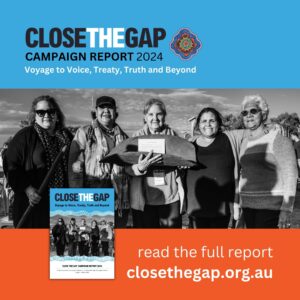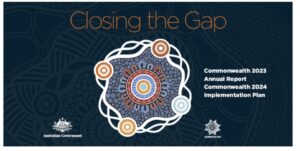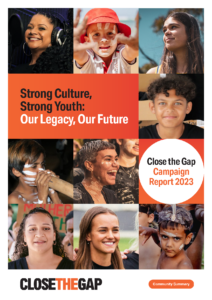Over two decades ago our leaders stood together asking us to imagine a more just, equitable and reconciled nation. And today, we stand on the shoulders of those leaders, asking our nation to Be a Voice for Generations.
As we mark the beginning of Reconciliation week, which is commemorated by the success of the 1967 referendum, we are reminded of those from a different generation who asked us to build a nation worthy of the next.
In 1967, an overwhelming majority of this country voted yes. That historical vote-to constitutional reform- ushered in a new era for Aboriginal and Torres Strait Islander peoples, encompassing all the hope and promise that only inclusion and recognition can give. Since then, we as a nation have come far, but there is still much work to do.
The 1967 referendum legislated that Aboriginal and Torres Strait Islander people be counted in the national census. To be visible in all those invisible spaces.
This year’s referendum asks for Aboriginal and Torres Strait Islander peoples to be recognised in the constitution through a representative voice to the Parliament and Government. To be recognised and heard, in all those spaces where their voices are silent.
We find ourselves at a pivotal moment. A moment eloquently described by Minister Linda Burney where, “each of us can put our shoulder to the wheel of history and turn it”. This is our opportunity to take another step along the journey, to strengthen the foundation, and propel our nation to its ultimate destiny – a truly reconciled nation.
In many ways the current referendum is simply a continuation, the next chapter, in this nation’s march towards justice, equality, truth telling and healing. But we cannot move forward if we are not prepared to listen with openness and care.
Discussions about the referendum can be hard to navigate. There is uncertainty, there is noise, there is confusion and mistrust. It can be hard to wade through the intentional dis and misinformation, but we are not as divided as the current political discourse suggests.
Research undertaken by Reconciliation Australia demonstrates that there is an overwhelming amount of good will from non-indigenous Australians. For decades, allies, friends, neighbours, and strangers, have stood with Aboriginal and Torres Strait Islander people across this nation and demanded more. They have listened, they have shared, and they have called for justice.
We all want to live in a nation that is marching towards justice and equality, striving for excellence and fairness, building opportunity into the fabric of its great story.
The only question is, how do we get there?
What is painfully obvious is that we cannot keep doing more of the same. As Tom Calma highlighted “despite some successes the overall data remains bleak and shows only slow improvements in some areas of health status, with no progress on others over the past decade”. That statement was given over two decades ago and is a true today as it was then.
We need a circuit breaker. We cannot continue to have spaces that are void of Aboriginal and Torres Strait Islander people’s leadership, voices, ideas, and solutions.
If we don’t create systemic change to the way that we work with Aboriginal and Torres Strait Islander peoples, if they do not have a voice to represent them at the highest levels of government, there cannot be any realistic expectation that their lived experiences would markedly change.
In 20 years from now do we still want to be talking about, black deaths in custody, Aboriginal and Torres Strait Islander people’s health disparity, disproportionately high incarceration, and child removal rates?
The answer is no, we don’t. But the truth is, without change, we will be.
During the Wiyi Yani U Thangani Summit young women and girls stood at the podium in a filled auditorium and delivered their youth statement. With dignity and inspiration, they told us that “[a]s the largest demographic of First Nations people, young people deserve the right to speak and be heard”. That they “will continue to show up” but “[a]s young people in the 21st century, [they] inherit the legacy of…systems that continue to fail them”.
Through their stories of the past, and visions of the future, they reminded us, that through “love, care and respect” Aboriginal and Torres Strait Islander peoples and non-indigenous Australians could strengthen our relationships and build the country that our ancestors dreamed of.
They reminded us that, together, we can be the authors of our destiny and write the next chapter of the Australian story. A chapter of promises fulfilled, of dreams realised – a national story filled with hope, opportunity and equality for all. It is our collective responsibility to lead and heal this nation – to stand on the shoulders of those who came before us and be the voice for their generation and those to come.
Just like the women and girls at the Wiyi Yani U Thangani Summit, the spirit of this land is calling us, this moment is calling us, propelling us to be courageous and embrace and create change. Together, we can ensure that all future generations inherit a legacy that is worthy of them and this nation.
As we move into a week of events and reflect on how we can create meaningful change – we must ask ourselves, what can we do to Be a Voice for Generations?
National Close the Gap Campaign – Co-Chairs
June Oscar AO – Aboriginal and Torres Strait Islander Social Justice Commissioner – Australian Human Rights Commission
Karl Briscoe – CEO – National Association of Aboriginal and Torres Strait Islander Health Workers and Practitioners




